Homelessness and the half of Cork many of us have not seen
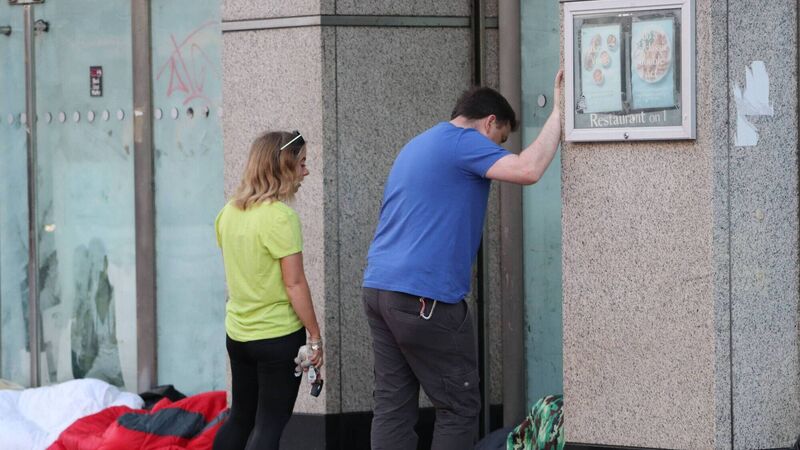
Noreen Twomey and Kevin Coughlan of the Cork Simon outreach team chatting with a homeless person in the doorway of the former Debenhams on Patrick's Street. Picture by David Doyle.
It’s 6am on a summer’s morning in Douglas, and two members of Cork Simon’s outreach team are making their way through a dense curtain of decorative foliage at the centre of the village. You’d never think it, but someone has been sleeping in here the past few weeks, and the outreach workers — Noreen Twomey and Kevin Coughlan — are anxious to meet her and make sure she’s alright.
“There’s her sleeping bag,” Kevin says. “She’s already gone for the morning.”
It’s the same story a little later, in the brambles across the way from the Fingerpost, where a green tent has been abandoned for the day. “Generally speaking, people don’t tend to stick around once they’re awake,” Noreen says.
For over 20 years, Cork Simon’s outreach team has been out meeting rough sleepers five mornings a week. This morning, the team will meet 26 people — 21 men and five women. When they return to the day centre on John Anderson Quay, they will meet a further four people — three men and a woman.
It’s 6.30am, and the team is back in the city centre, over by Cork Simon. Two couples are asleep in sleeping bags on Oliver Plunkett St Lower. Noreen and Kevin check on them, and gently tell them it’s very early, to go back to sleep if they can, and to be sure to call into the shelter at 9am for some breakfast.
Unusually, there’s no one asleep in the doorway at the back of the Clayton Hotel this morning. Five years ago this November, Kathleen O’Sullivan was sleeping rough here one bitterly cold night, when she told this reporter her aunt had died in that very doorway and, she predicted, she would die there too. Three weeks later, Kathleen’s prediction came true.
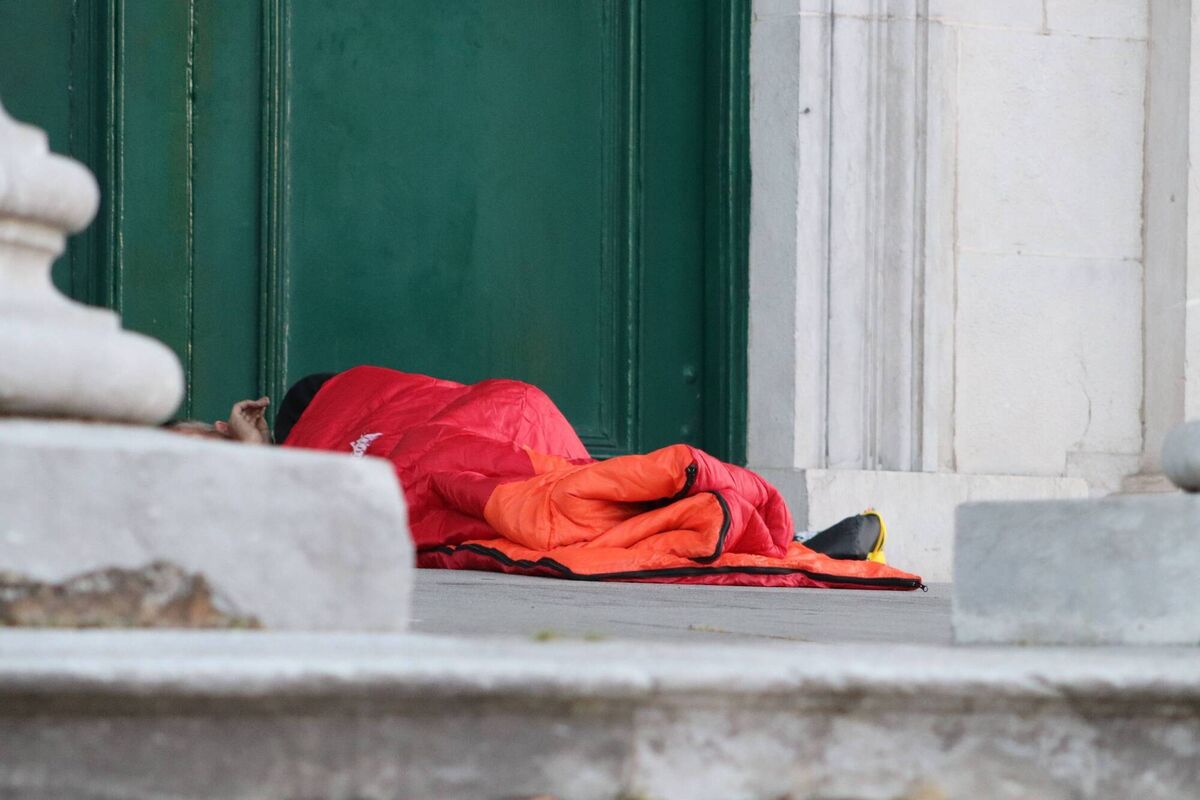
On the boardwalk, a man in his 50s is waking up behind the lift to Lapp’s Quay car park. He chats with Noreen and it’s clear he has a lot of time for her. She and Kevin know the first name of every person they meet this morning, and they are greeted warmly as equals and as friends.
By the Custom House, the early morning sun is beaming golden as the gates open at the Port of Cork.
Fifteen minutes later, over on St Patrick’s Street, a man and a woman are in sleeping bags in the doorway at the corner with SS Peter and Paul Place. Noreen and Kevin give them water and sunscreen. The pavement is wet from cleaning, and by the robo-trees a council worker is emptying the bins.
“Take care in the city we share,” says the old Covid sticker on the bin outside Permanent TSB.
Two men are sleeping in the doorway of Penneys, and one of them has a crutch beside him. A window cleaner works around them. A seagull screeches outside the old Debenhams, where five people are lying in the doorway, some asleep, some awake, some dozing. One man has a bandage on his head, blood seeping through. He can’t remember how he got it.
“Please call into the shelter at 9am,” Noreen tells them. “It’s way too hot to be outdoors all day.”
This is during the height of the heatwave, and in two hours it will be 20C.
At 7am, Kevin tells a man in a sleeping bag on the steps of St Patrick’s Church on the Lower Glanmire Road to be sure and call to the shelter. From behind The Dean, the sun is glaring, blinding.
At 7.10am, over by Fitzgerald Park, just off the Mardyke, Noreen and Kevin slip through railings into an overgrown patch of ground strewn with used condoms and soiled toilet paper. One or two used sanitary towels are scattered around too. At the base of a tree is a used needle. It was in this jungle that Timmy Hourihane, a homeless chef, was killed, beaten to death, three years ago.
In the undergrowth, beside a tent you would never spot if you didn’t know it was there, Noreen calls: “Hello, we’re from Cork Simon” and a man’s voice replies:
“Ye’re not the shades?” Noreen laughs and says: “I’m too small to be a shade.”
Two men and a woman are in the tent. Noreen chats with them and urges them to call into the shelter.
Around half seven, we look in vain for people in the wilderness away to the west of the skate park, across the river from Sunday’s Well, as we pick our way through used condoms and discarded needles. It’s the same story later on, over by the Lee Fields, where sleeping bags are abandoned and a tent can be seen away between the trees, but we can’t quite figure out a way to reach it.
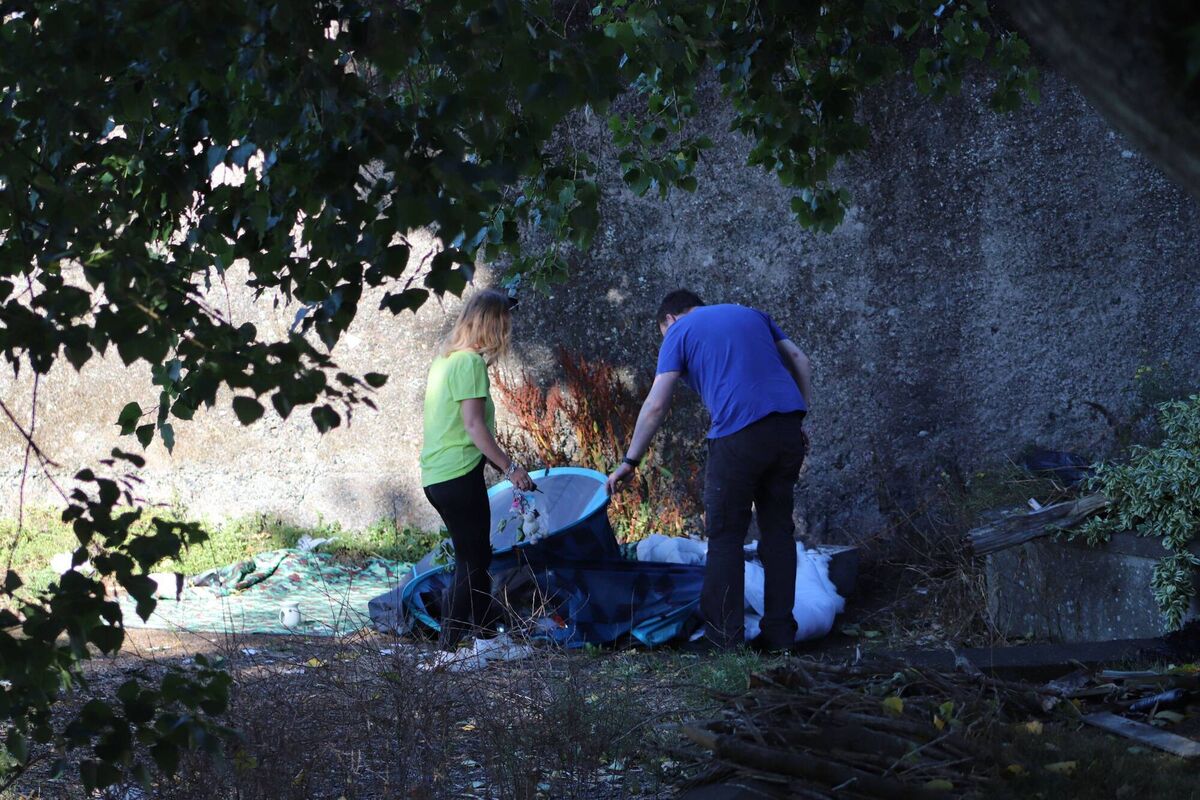
At 8.20am, outside Fitzgerald’s Park, as we wait for it to open, Kevin and Noreen say they both started with Cork Simon the same day, four years ago, in different positions. Noreen, who has a bachelor’s and master’s degree in counselling, mental health, and psychotherapy, started in the outreach team last year. Kevin, who has a bachelor’s degree in social care and worked for eight years in the Brothers of Charity, started in outreach in January.
At 8.55am, Kevin swings around railings, over open water, on Kennedy Quay, to what appears at first glance to be just a sheet of tarpaulin hanging over a pretty precarious ledge. “You wouldn’t think somebody lives here,” he says. Socks hang on the adjacent security fence to dry.
“We used to go out every morning at 7am, but we’ve moved that to 6am, and it still can be hit and miss whether we can meet people in time. We know the person living here, and, all being well, he should be calling into the shelter around 9am.”
Along the Marina, well-fed ducks are living their best lives on the Atlantic Pond as Kevin and Noreen patrol the overgrown waste ground which is literally off the beaten path. This morning, they don’t find anyone, but not so long ago, Kevin says, at least 15 people lived here. He adds that much of this place is crawling with rats.
It’s almost 10am, and as we return to our cars, Noreen notes that she has done 12,000 steps this morning. She and Kevin have a full day’s work ahead of them back in Simon, as they will let the gardaí, the HSE, and the city and county councils know about the people they have met this morning.
UNSEEN CORK
“The half of Cork you have not seen” goes the old line, and there is indeed a part of Cork most of us have not seen, and likely will never see, and it’s just below the surface, just around the corner, and maybe just beyond the end of a really, really bad day.
It’s a part of Cork that is a primal, lonely, and dangerous place, hidden away in the shadows and the undergrowth, and a place where people who could well be ourselves or our loved ones shuffle from one violent assault to the next, where, as many a rough sleeper has observed, “You couldn’t do this sober”, and where there but for the grace of God goes any of us.
It’s a place too, though, where perhaps for the grace of God there are kind and decent people who know you by your first name and who will always do their best to help you, who will direct you to services, and who will just make you feel like a human being again.
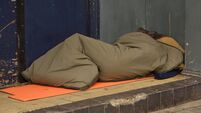

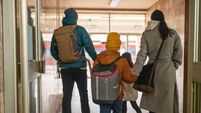

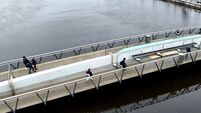





 App?
App?


